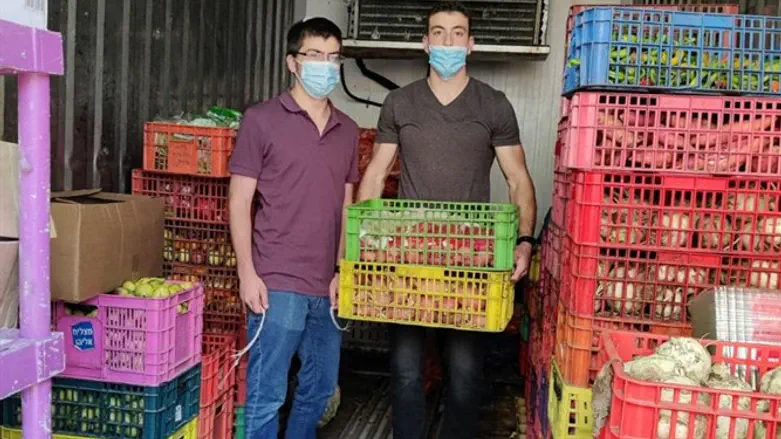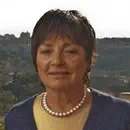
I love Shmitta. After all, the Torah was meant to be kept in Eretz Yisrael.
Every time I go shopping for fruits and vegetables since Rosh Hashanah, when the shmitta year commenced, a smile lights up my face. Does that seem strange, perhaps even unenlightened? Shouldn't I be more obviously worried about keeping the mitzvah properly?
After all, really important conferences, articles, books, lectures, Q & A programs and columns abound in Israel for months before the land's Sabbatical year begins, all of them trying to give observant Jews a handle on the halakhic aspects of the mitzvah or an opinion on what it is about philosophically and sociologically, with many focused on getting through the year without too many halahkic mistakes.

Photo: Manual for famers on shmitta
The shmitta year, for readers who may not be familiar with it, is one of the commandments called mitzvoth hatluyot baaretz that are kept by Jews vis-à-vis the Land of Israel The Torah tells us that the land must lie fallow during the seventh year of the cycle of tithes, just as man must rest on the seventh day. Shabbat Shabbatonyihye la'aretz, it says in Vayikra - Leviticus - chapter 25, "the land must have a year of Sabbath rest". Natural produce of that year on soil that is included in the commandment's boundaries (a subject in itself), is free for the taking and is not allowed to be sold for profit.
Various benefits arise from this commandment, among them the land's fertility re-enriching itself, the breaking down of boundaries between rich and poor, and the possibility for those who work the holy land (a spiritual mitzvah in itself) to study Torah.
Various practical issues also arise from this commandment, including the date the sale of each product becomes prohibited as grown or harvested during shmitta (most fruits, for example, are problematic next year as they begin their growth during the shmitta year, but ripen the next), how to avoid the prohibition of eating produce secretly planted during the shmitta year masquerading as natural growth (issur sfichin, in halakhic language) and how today's farmers are supposed to survive without planting or selling.
There are various halakhic solutions, depending on which sector you are in, but not exclusively limited to one sector. Naturally, much controversy, heated at times, surrounds them.
Oh, and when buying exported Israeli products that contain produce, if you are Jewish, the same problems arise.
The above is by no means an accurate or thorough halakhic description, it is just enough for readers who have never experienced shmitta in Israel to know what I am talking about. For more, ask your rabbi, buy one of the many books on the subject or check the basics on Rabbi Google, as they say here in Israel.
One can avoid involvement in the people of Israel's return to the land by only buying pre-shmitta produce (including products that contain produce, whose dates can be checked on the cans or packages), purchasing from Arab farmers or sticking to produce that is grown in other countries. This is no small feat, organized by various hareidi hekscher-granting facilities and considered quite reliable.
But the Religious Zionist shmitta year is the one I find exciting. It is filled with an ever present and joyful consciousness that we have returned to the land of our forefathers and witnessed the actualization of the words in Ezekiel that the Talmud calls signs of imminent Redemption: "and you, O hills of Israel, give forth your fruits..for my people.. because they are arriving."
How lucky we are! We can be proactive in keeping the laws of shmitta because we are growing fruits, grains and vegetables on our land once more!
And the produce sections marked Otzar Haaretz (literally, Treasures of the Land) which are where my smile broadens, are a result of that miracle and organized to maximize it. There are various types of shmitta agricultural produce in these stores, labeled so that one can keep one's family's customs or one's rabbi's directions.
First, there are products labeled "sixth year", that is, pre-shmitta.
Then, there are products labeled as grown in Israel, but out of the halakhic shmitta boundaries.
There are also products labeled as grown on land sold to non-Jews for the year, a solution called heter mechira allowing farmers to work the land (halakhic details are beyond the scope of this article) and sell the crops as suggested many years ago by Rabbi Yitzchak Elchanan Spector and by Rabbi Avraham Hakohen Kook, Israel's first Chief Rabbi, so that the early pioneers could survive the year.
Heter mechira is the method preferred by late Chief Rabbi and head of Merkaz Harav Yeshiva Rabbi Avraham Shapira as having the least halakhic problems for produce grown within halakhic shmitta boundaries in the land of Israel today as well. It provides a solution for the farmer's finances, but also a national solution (https://www.gov.il/he/departments/general/shmita3) in that non-observant farmers' produce arriving in supermarkets and greengrocers all over the country is not prohibited fruits of shvi'it – and also ensures that agriculture remains viable in the Jewish state, a matter of paramount importance in case of boycotts or war. It prevents creeping Arab encroachment on fallow land (when I ran an agricultural youth village I learned how that is a real issue) and can let those who wish to avoid the purchase of produce from hostile Arab neighbors, such as Gazans.
Add the most exciting of all in the Otzar Haaretz stores, though the most difficult to be careful with – are the products supervised by the rabbinic courts (Otzar Beit Din), to which the Torah gives special powers – products that grow during shmitta, as the Torah mandates, on land that is not sold for the year, products that the poor and hungry can gather freely.
Today, these are grown with rabbinic court supervision of the type of agricultural work allowed on them and of sfichin, then distributed while reimbursing farmers for their costs and for delivery, passing the costs involved on to the consumer. In many neighborhoods, trucks arrive filled with bags of produce at prices set by these rules and consumers happily come out to buy them. This was the Chazon Ish's preferred way to observe shmitta.

Photo: Otzar Haaretz products
Otzar Beit Din products have the "sanctity of the seventh year", they are holy as only agricultural products of Eretz Yisrael can be. Every bit must be eaten or drunk (we check our grape juice and wine bottles next year too for the Otzar label), any peels and seeds kept in a container until inedible before they are thrown away and they may only be used for commonly known purposes. We have a special container/bag in the kitchen for them and even the littlest grandchildren know what to do.
And these products are not allowed to leave Eretz Yisrael.
So, as I said, every time I go into that "Otzar Haaretz" store, my heart gives a leap.
I think for a second about a young relative, here for a year from the US during shmitta, who said that she would consider aliya if not for the fear of erring in keeping the land-dependent mitzvot properly. There are those in the Diaspora who do not buy any Israeli produce for that reason. It is a serious halakhic issue, but I, far from a halakhic expert, would like to believe that Hashem (G-d) wants us to try our best. And that doing so should be part of the Torah mandate of serving Hashem with joy.
So -
Thank You, Hashem, for letting me live in the generations that have "Otzar Beit Din" tomatoes that I use to the last drop reminding me that even the agricultural world of Israel is filled with holiness.
Thank You for the heter mechira (sold land) produce that reminds me that the Torah was given to man to arbit halakha through Torah Sages.
Thank You for religious Zionist kibbutzim like Shluchot, that write "product of the sixth year" on their bags of carrots so that people will know they can buy them with impunity – and for the non-observant ones that make the same efforts, even if it is for economic reasons because they, too, realize that farming in Eretz Yisrael is not the same as in Kansas.
Thank You for my "Otzar Haaretz" storekeeper, a kippa-clad Yemenite with an extensive knowledge of halakha as well as produce, who explained that something I was buying was grown outside the shmitta area in case I didn't understand the label and reminded me of the boundaries involved.
Thank You for an opportunity to live mitzvot that were once only theoretical knowledge and that my forbears longed to observe.
And for those of you still to make aliya - think what Torah joy is awaiting you!
Rochel Sylvetsky made aliya to Israel with her family in 1971, coordinated Mathematics at Ulpenat Horev, worked in math curriculum planning at Hebrew U. and as academic coordinator at Touro College Graduate School in Jerusalem. She served as Chairperson of Emunah Israel and was CEO of Kfar Hassidim Youth Village. Upon her retirement, Arutz Sheva asked her to be managing editor of the English site, a position she filled for several years before becoming its Senior Consultant and Op-ed and Judaism editor. She serves on the Boards of Orot Yisrael College and the Knesset Channel.
